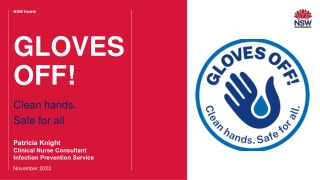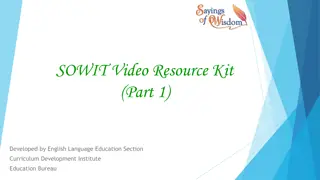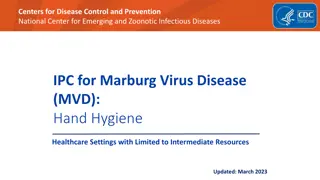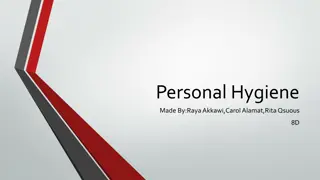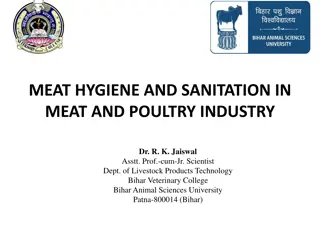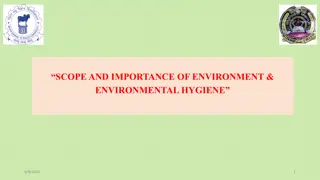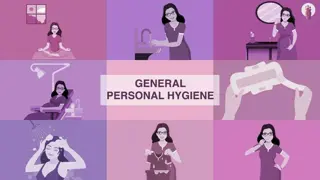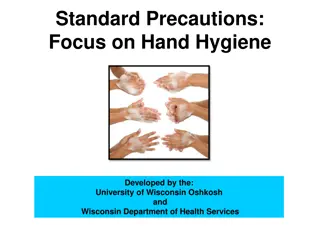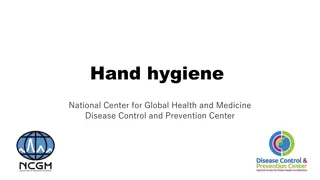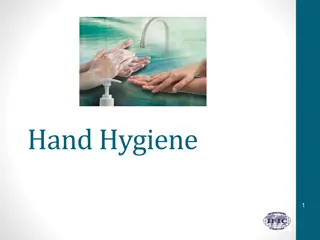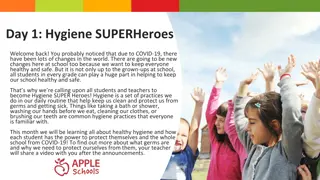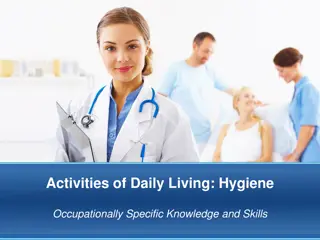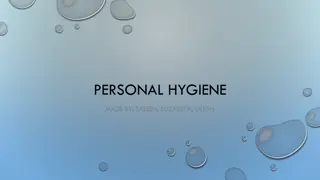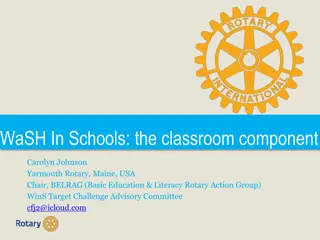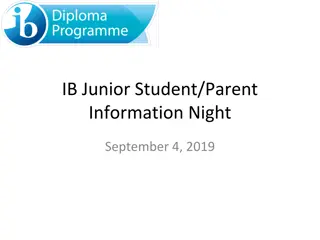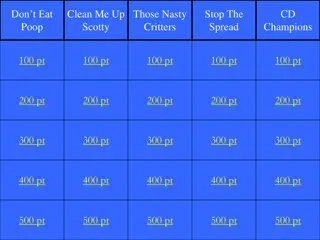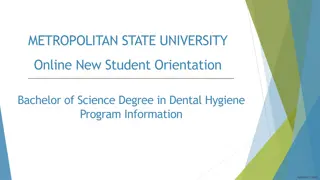Learning Resources for Junior Secondary English Language: Health and Hygiene Focus
This resource package aims to enhance junior secondary students' English language skills through activities focusing on health and hygiene during the COVID-19 pandemic. Students engage in reading, writing, and critical thinking tasks to develop awareness and communication skills while exploring good habits for staying healthy. The material includes exercises on identifying needs, interpreting online discussions, and analyzing text types such as leaflets from the Department of Health.
Uploaded on Oct 03, 2024 | 1 Views
Download Presentation

Please find below an Image/Link to download the presentation.
The content on the website is provided AS IS for your information and personal use only. It may not be sold, licensed, or shared on other websites without obtaining consent from the author.If you encounter any issues during the download, it is possible that the publisher has removed the file from their server.
You are allowed to download the files provided on this website for personal or commercial use, subject to the condition that they are used lawfully. All files are the property of their respective owners.
The content on the website is provided AS IS for your information and personal use only. It may not be sold, licensed, or shared on other websites without obtaining consent from the author.
E N D
Presentation Transcript
LEARNING AND TEACHING RESOURCES FOR JUNIOR SECONDARY LEVELS (ENGLISH LANGUAGE) GIFTED EDUCATION SECTION, CDI, EDB 1
Topic: Health and hygiene To identify good habits and ways to help people stay healthy during the COVID-19 pandemic; To develop reading and writing skills; and To write leaflets to inform different stakeholders in the neighbourhood of ways to stay healthy during the COVID-19 pandemic. To understand the features of a leaflet To understand the use of imperatives to give advice Learning Objectives: Language Focuses: 2
Part 1: Gettingstarted List FIVE things you do every day to help you stay healthy and hygienic. Explain why you do so and how these habits/things you do keep you healthy and clean. Things you do daily Reasons 1 2 3 4 5 3
Part 2: Reading - Learning about the needs/problems faced by different stakeholders in the society Your friends have told you about an online discussion forum about COVID-19. Read the posts on the discussion forum in the worksheet and answer questions 1 8 on slides 4 6. 1. Why doesn t Tony clean his room? 2. What is Tony s tone in his post? A. depressed B. critical C. enthusiastic D. sympathetic 4
3. Find words in Lindas post that mean the same as the following: (i) outbreak (ii) nourishing (iii) complimented 4. Why do you think Linda suggest Tony to help take up some chores at home? 5. Why do you think Peter and his colleagues bring their lunchboxes instead of having lunch at the restaurant? 6. What does our (line 30) refer to? 7. What is the purpose of the last paragraph in Peter s post? 5
8. Complete the table with information from the online discussion forum. Person Tony Wong Problem (with elaboration) He has poor ______ ______. his bedroom is dirty. he has terrible body odour. She ________ _________ to her smartphone. she stays in her room playing with her smartphone all the time. He almost fell when the bus stopped suddenly. he ________________ ________________. Possible Solution He should ____________ _____________________ _____________________. Linda Chan s daughter Her mother ___________ _____________________ _____________________. Peter Cheung He should ____________ _____________________ _____________________. 6
Part 3: Understanding the Text Type: Leaflet Read the information leaflets from Department of Health. Can you identify some key features of a leaflet? Complete the table on slide 9. Heading Sub-heading Eye-catching Title Reference: https://www.info.gov.hk/tb_chest/doc/prevent_eng.jpg 7
Heading Language - use of imperatives Click HERE to learn more about Imperatives! Reference: https://www.chp.gov.hk/en/resources/e_health_topics/pdfwav_2959.html?page=2 8
Features (What?) Title - bigger font size - key message of the leaflet shown to readers Purpose (Why?) Headings/ sub-headings - short and precise Language - use of imperatives Next 9
What are imperatives? Compare these two sentences: (1) Could you open the windows? (2) Open the windows. You probably think that the first sentence is more polite and the second sentence sounds like an order/instruction. FORM In sentences like (2), the verb forms are called imperatives . Read the following sentences and circle the imperatives: (a) Come here. (b) Be quiet. (c) Have a drink! (d) Don t worry. Negative imperatives : Do not + Verb (infinitive form) Affirmative imperatives : Verb (infinitive form) 10
USAGE Imperatives are used: (a) to tell or ask people to do things e.g. Check your homework carefully before submission./Don t shout in the classroom. e.g. Wash your hand thoroughly. (b) to make suggestions (c) to give advice or instructions e.g. Pour the hot water into the cup and add some milk. * as shown in the information leaflet on slide 8 (d) to encourage and offer e.g. Have some more tea. (e) to express wishes for people s welfare e.g. Enjoy your holiday. 11
Extended activity Part A: Put a tick next to the sentences that contain imperatives. 1. Mix the yeast with the flour in the mixing bowl. 2. Would you close the door on your way out? 3. I want you to look both ways before you cross the road. 4. Be careful with that box. There s a glass lamp in it. 5. Can you please pick me up at 6 p.m.? 6. Pass the salt, please. 7. Don t forget to bring your hand sanitiser before you leave. 8. I don t want you to clean the clothes. 9. Stop yelling! 10. You need to stay vigilant during the pandemic. 12
Extended activity Part B: Rewrite the sentences without the use of imperatives in Part A as imperatives. 1. 2. 3. 4. 5. Back to Part 3 13
Part 4 : Writing Task (A leaflet) You are a member of the Social Services Club at your school. You and the other club members decide to write a leaflet to raise concern over the issue of COVID-19 in your neighbourhood. Useful tips to stay healthy and hygienic will be given to your readers. Your teachers prepare a choice board for you. Include some areas from the choice board below in your leaflet. Getting around Hong Kong Living Diet environment ? Personal Hygiene Sleep (your own idea) Leisure activities Exercises Habits 14
You may work on any ONE of the topics below. (a) Brainy Beginner Write a leaflet to be sent to your classmates. Give them ideas on how to stay healthy and hygienic on any one or two area(s) from the choice board. (b) Logical Learner Write aleafletto be sent to all students in your school. Give them ideas on how to stay healthy and hygienic on any three areas from the choice board. (c) Creative Challenger Write a leaflet to be sent to all students and their parents in your school. Give them ideas on how to stay healthy and hygienic on any four areas from the choice board. 15
Self-evaluation Use the checklist below to evaluate your work. Put a tick in the appropriate boxes. CONTENT My ideas are varied and well supported with elaboration. My advice addresses the need and concern of the target readers (there is a high awareness of audience). LANGUAGE I use imperatives to give advice. The meaning of each sentence is clear. I have used the sentence structures and tenses I have learnt. I use new vocabulary and I have checked my spelling carefully. ORGANISATION I give my leaflet an eye-catching title. I use headings and sub-headings to help organise my ideas. I put relevant ideas together under the same headings/ sub-headings. I use appropriate connectives to link my ideas. 16
For more information on combatting COVID-19, please visit the website of the Centre for Health Protection, Department of Health: https://www.chp.gov.hk/en/index.html 17
WORD WHIZ Visit the following dictionary web sites (in alphabetical order) to learn more about the pronunciation, definition and usage of words: 1. Cambridge Dictionary https://dictionary.cambridge.org/ 2. Oxford Learner s Dictionaries https://www.oxfordlearnersdictionaries.com/ 18
Suggested Answers Part 2: Reading 1. He stays up late to play online games with his friends so he is tired. 2. A 3. (i) pandemic (ii) nutritious (iii) praised 4. She wants Tony to spend less time on online games and bond with his parents. 5. Peter can wear a protective mask/ avoid holding or touching the handrails// poles (other possible answers are also accepted) 6. Peter and his colleagues 7. To encourage readers to stay positive// optimistic and not to be afraid of the pandemic/ to tell readers that they should fight against the virus together. 19
Suggested Answers 8. Person Tony Wong He has poor personal hygiene. his bedroom is dirty. he has terrible body odour. Problem (with elaboration) Possible Solution He should clean his room, change his clothes and wash them regularly. Linda Chan s daughter She is addicted to her smartphone. she stays in her room playing with her smartphone all the time. Her mother invited her to cook and the family praised her cooking/ cleans the home and cooks with her every day/ spends time getting to know her more. He should clean his hands with alcohol-based handrub after touching the handles or poles on public transport. Peter Cheung He almost fell when the bus stopped suddenly. He does not want to/ dare not touch the handles/ poles. 20
Suggested Answers Part 3: Understanding the Text Type: Leaflet Features (What?) Title - bigger font size - key message of the leaflet shown to readers Headings/ sub- headings - short and precise Purpose (Why?) To capture readers attention To clearly communicate the key message To guide the readers through each section some information is organised with numbers and bullet points To serve as signposts to important information in the leaflet. Key words and phrases are picked out to get the readers attention To make the message direct and persuasive Language - use of imperatives 21
Suggested Answers What are imperatives? Part A (The imperatives are circled for reference) 1. Mix the yeast with the flour in the mixing bowl. 2. Would you close the door on your way out? 3. I want you to look both ways before you cross the road. 4. Be careful with that box. There s a glass lamp in it. 5. Can you please pick me up at 6 p.m.? 6. Pass the salt, please. 7. Don t forget to bring your hand sanitiser before you leave. 8. I don t want you to clean the clothes. 9. Stop yelling! 10. You need to stay vigilant during the pandemic. 22
Suggested Answers What are imperatives? Part B 1. Close the door on your way out. 2. Look both ways before you cross the road. 3. Please pick me up at 6 p.m. 4. Don t clean the clothes. 5. Stay/Be vigilant during the pandemic. 23
Stay Positive and Be Proactive! Together, We Fight the Virus! 24



